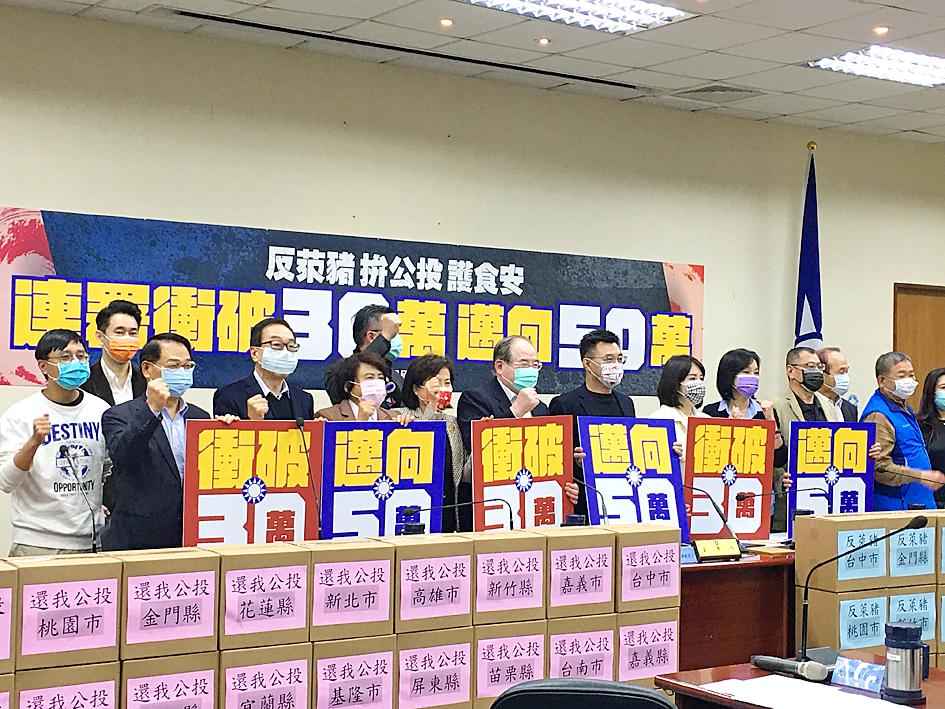The Chinese Nationalist Party (KMT) yesterday said it has collected more than 320,000 signatures backing its petition to hold a national referendum on the importation of pork containing the animal feed additive ractopamine.
The KMT is holding a signature drive to push for a public referendum on imported pork with racotpamine residue, and another referendum on when referendums should take place.
The first proposal, officially headed by KMT Legislator Lin Wei-chou (林為洲) and variously referred to by the party as the “anti-ractopamine pork” or “food safety” referendum, would ask voters if they agree that the government should impose a complete ban on the importation of meat, offal and related products from pigs fed with ractopamine.

Photo: Lin Liang-sheng, Taipei Times
The second referendum proposal, of which KMT Chairman Johnny Chiang (江啟臣) is the lead proposer, would ask voters if they agree that referendums should be held on the same day as a nationwide election if the election is scheduled to take place within six months of a proposal to hold a referendum being approved.
According to law, referendums from this year onward can be scheduled once every two years on the fourth Saturday of August, making Aug. 28 the next possible date.
As of yesterday, petitions for both referendum questions have surpassed the number of signatures that are legally required for the proposals to advance, Chiang told a weekly KMT Central Standing Committee meeting in Taipei.
More than 319,000 signatories have backed the party’s call for a vote on whether future referendums should be tied to general elections, while its petition for a “food safety” referendum has received more than 320,000 signatures, he said.
Under the Referendum Act (公民投票法), the KMT must submit valid signatures from no less than 1.5 percent of the total electorate in the most recent presidential election — or nearly 290,000 people — for its proposed questions to be put to vote.
Central Election Commission data showed that 19,311,105 people were eligible to vote in the presidential election on Jan. 11 last year.
Chiang said that to prevent duplicate and other invalid signatures, as well as possible “manipulation” by the Democratic Progressive Party, from harming its efforts, the KMT is to continue its signature drive.
Its goal is to collect 500,000 signatures for each proposal before the Lunar New Year, he added.
The Lunar New Year falls on Feb. 12 this year.
Each box of petition signatures represents people’s “strong backlash” against the government’s decision to allow imports of US pork containing ractopamine, as well as people’s expectations for the KMT, Chiang said.

The Ministry of Foreign Affairs (MOFA) yesterday voiced dissatisfaction with the Comprehensive and Progressive Agreement for Trans- Pacific Partnership (CPTPP), whose latest meeting, concluded earlier the same day, appeared not to address the country’s application. In a statement, MOFA said the CPTPP commission had "once again failed to fairly process Taiwan’s application," attributing the inaction to the bloc’s "succumbing to political pressure," without elaborating. Taiwan submitted its CPTPP application under the name "Separate Customs Territory of Taiwan, Penghu, Kinmen and Matsu" on Sept. 22, 2021 -- less than a week after China

ALIGNED THINKING: Taiwan and Japan have a mutual interest in trade, culture and engineering, and can work together for stability, Cho Jung-tai said Taiwan and Japan are two like-minded countries willing to work together to form a “safety barrier” in the Indo-Pacific region, Premier Cho Jung-tai (卓榮泰) yesterday said at the opening ceremony of the 35th Taiwan-Japan Modern Engineering and Technology Symposium in Taipei. Taiwan and Japan are close geographically and closer emotionally, he added. Citing the overflowing of a barrier lake in the Mataian River (馬太鞍溪) in September, Cho said the submersible water level sensors given by Japan during the disaster helped Taiwan monitor the lake’s water levels more accurately. Japan also provided a lot of vaccines early in the outbreak of the COVID-19 pandemic,

Kaohsiung Mayor Chen Chi-mai (陳其邁) on Monday announced light shows and themed traffic lights to welcome fans of South Korean pop group Twice to the port city. The group is to play Kaohsiung on Saturday as part of its “This Is For” world tour. It would be the group’s first performance in Taiwan since its debut 10 years ago. The all-female group consists of five South Koreans, three Japanese and Tainan’s Chou Tzu-yu (周子瑜), the first Taiwan-born and raised member of a South Korean girl group. To promote the group’s arrival, the city has been holding a series of events, including a pop-up

A home-style restaurant opened by a Taiwanese woman in Quezon City in Metro Manila has been featured in the first-ever Michelin Guide honoring exceptional restaurants in the Philippines. The restaurant, Fong Wei Wu (豐味屋), was one of 74 eateries to receive a “Michelin Selected” honor in the guide, while one restaurant received two Michelin stars, eight received one star and 25 were awarded a “Bib Gourmand.” The guide, which was limited to restaurants in Metro Manila and Cebu, was published on Oct. 30. In an interview, Feng Wei Wu’s owner and chef, Linda, said that as a restaurateur in her 60s, receiving an